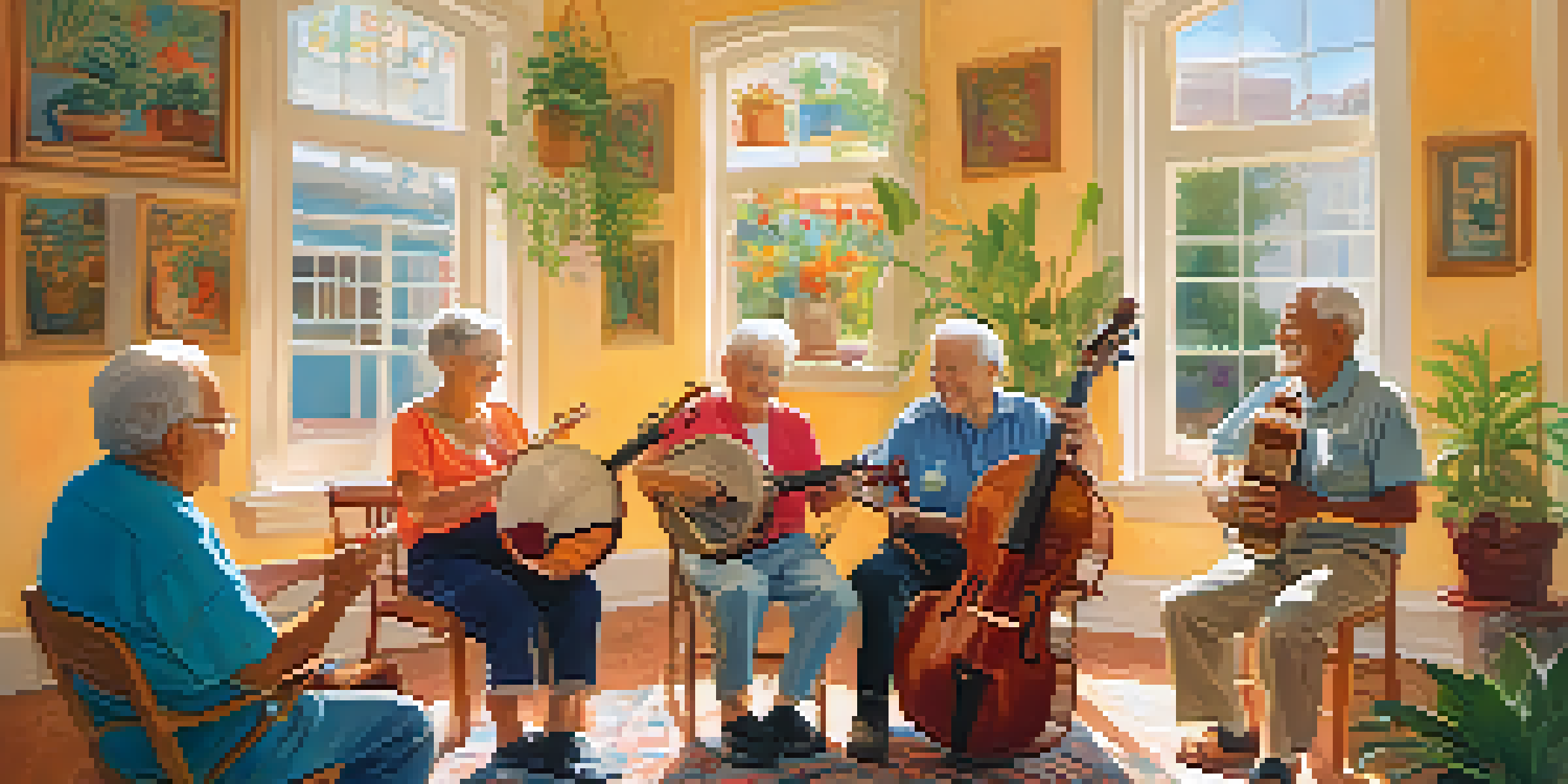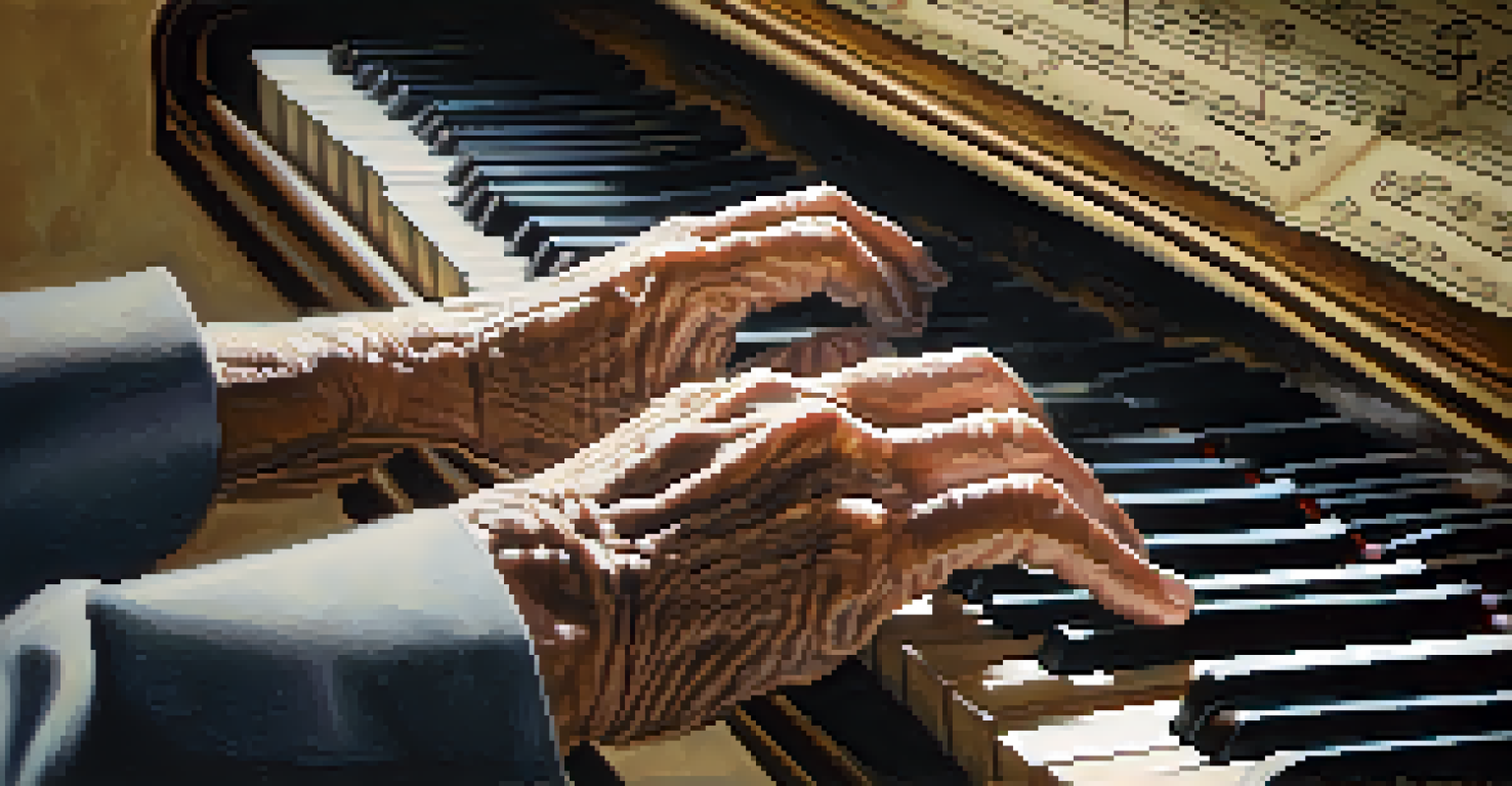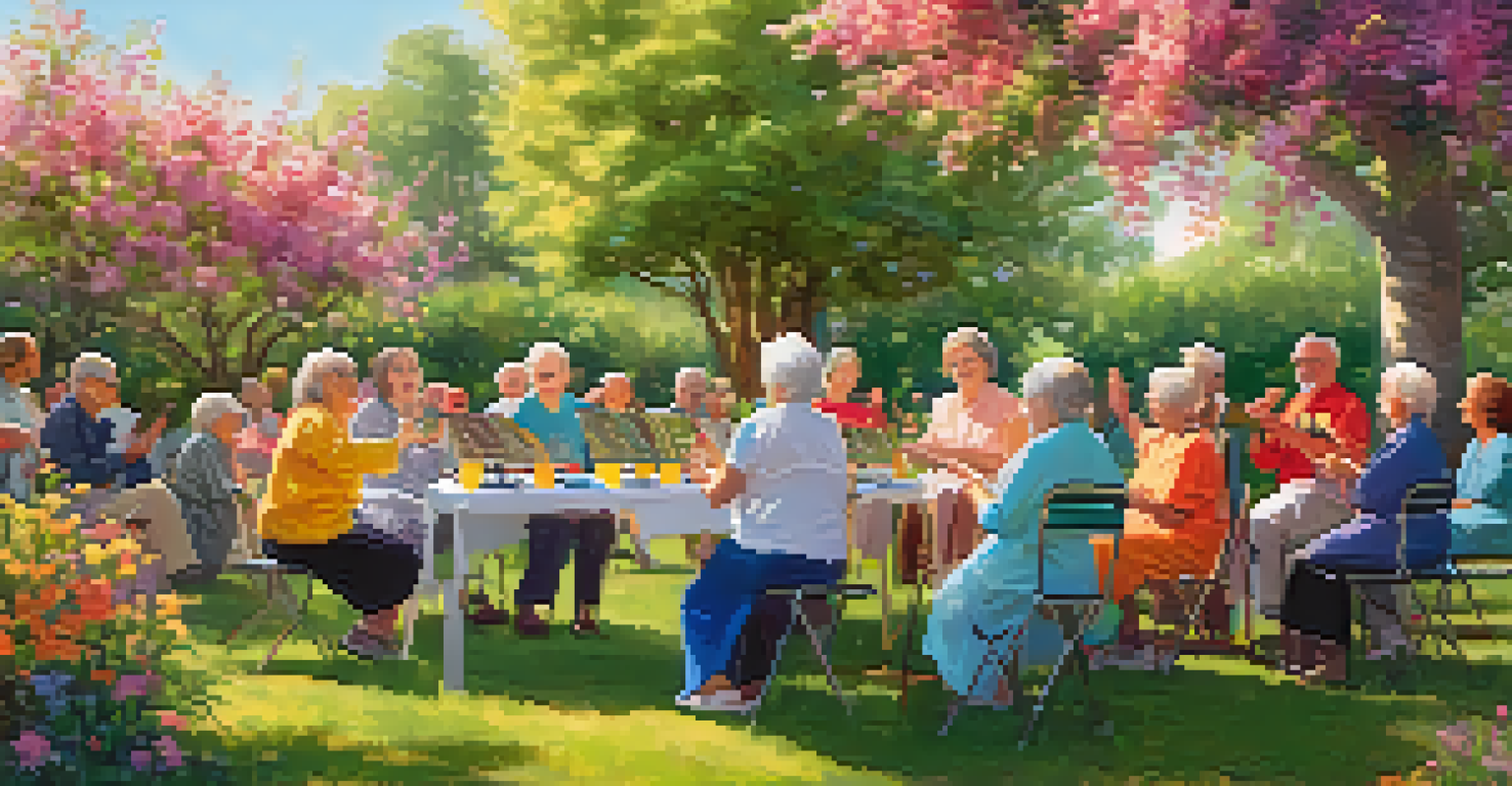The Role of Music Therapy in Enhancing Elderly Well-Being

Understanding Music Therapy and Its Benefits for Seniors
Music therapy is a clinical and evidence-based use of music interventions to accomplish individualized goals within a therapeutic relationship. For elderly individuals, it offers a unique way to engage with their emotions and memories. This type of therapy can be particularly beneficial in addressing various challenges faced by seniors, including cognitive decline and emotional distress.
Music can change the world because it can change people.
Studies have shown that music therapy can enhance communication skills, improve mood, and even increase cognitive function in older adults. For instance, a simple sing-along can spark joy and encourage social interaction, which is often vital for emotional health. Furthermore, the familiarity of certain songs can evoke cherished memories, creating a comforting atmosphere for seniors.
By incorporating music into therapeutic practices, caregivers can foster a sense of connection and belonging among elderly individuals. This not only aids in emotional regulation but also promotes a more vibrant daily life, making music therapy an integral part of elderly care.
The Science Behind Music and the Brain in Aging
Music has a profound impact on the brain, especially for older adults. Research indicates that listening to or playing music can stimulate multiple areas of the brain, enhancing cognitive functions such as memory and attention. This stimulation is crucial for seniors, as it can help mitigate the effects of aging on brain health.

For example, when elderly individuals listen to music they enjoy, their brains release dopamine, a chemical associated with pleasure and reward. This response can lead to improved mood and reduced feelings of anxiety or depression, which are common in older populations. It's fascinating how something as simple as a melody can trigger such positive effects.
Music Therapy Boosts Seniors' Health
Music therapy enhances emotional, cognitive, and physical well-being in elderly individuals.
Moreover, music therapy can help in the management of conditions like Alzheimer's and dementia by prompting memories and improving engagement. These interactions not only provide cognitive benefits but also enrich the emotional lives of seniors, giving them a sense of purpose and joy.
Benefits of Music Therapy for Mental Health in Seniors
Music therapy serves as an effective tool for enhancing mental health among the elderly. The therapeutic practice can reduce symptoms of depression and anxiety, often prevalent in this age group. Participating in music-based activities helps seniors express their feelings in a non-verbal way, providing an outlet for emotions they may struggle to articulate.
The power of music makes all the difference in the world, especially in the lives of those who are aging.
By engaging in music therapy, older adults can experience a sense of achievement and boost their self-esteem. Whether it's learning to play an instrument or simply singing along, these activities foster a sense of accomplishment and pride. This newfound confidence can ripple into other areas of their lives, promoting a more positive outlook.
In addition, the social aspect of music therapy should not be overlooked. Group sessions create a sense of community, combating feelings of isolation that many seniors face. The bonds formed through shared musical experiences can lead to lasting friendships, enhancing overall well-being.
How Music Therapy Enhances Physical Well-Being in the Elderly
While often associated with emotional and cognitive benefits, music therapy can also contribute to physical well-being in seniors. Engaging in music can encourage movement and physical activity, whether through dancing, drumming, or even simple hand movements. This physical engagement is crucial for maintaining mobility and overall health.
For instance, rhythmic activities can help improve coordination and balance, reducing the risk of falls—a common concern for aging adults. In many cases, music therapy can be integrated into rehabilitation programs, aiding recovery from injuries or surgeries. This multifaceted approach to health can significantly enhance quality of life.
Personalized Music Therapy Matters
Tailoring music interventions to individual preferences ensures a more effective and engaging therapeutic experience.
Moreover, the use of music can assist in pain management. Studies have shown that listening to soothing music can help alleviate discomfort and promote relaxation. This holistic approach ensures that seniors not only feel better emotionally but also physically, contributing to a more balanced state of health.
Personalizing Music Therapy for Individual Needs
One of the greatest strengths of music therapy is its adaptability to meet the unique needs of each individual. Therapists can tailor music interventions based on the personal preferences, cultural backgrounds, and specific challenges faced by seniors. This personalized approach ensures that the therapy is both relevant and effective.
For example, some seniors may respond better to familiar songs from their youth, while others might enjoy contemporary music or instrumental pieces. By incorporating their favorite genres, therapists can create a more engaging and fulfilling experience. This level of personalization fosters deeper emotional connections and enhances the therapeutic process.
Additionally, assessing the individual’s cognitive and physical abilities allows therapists to design activities that are both challenging and achievable. This careful consideration ensures that music therapy remains a source of joy and motivation rather than frustration, promoting an overall positive experience.
Integrating Music Therapy into Elderly Care Practices
Incorporating music therapy into the daily routines of elder care facilities can significantly enhance the overall quality of life for residents. Caregivers can easily integrate music sessions into activities, making them a regular part of the schedule. This consistent exposure to music can create a comforting and familiar environment for seniors.
For example, morning sing-alongs or afternoon dance sessions can uplift spirits and foster community among residents. Additionally, creating personalized playlists for individual seniors can help evoke positive memories and emotions, making each interaction more meaningful. This practice underscores the importance of tailoring care to the individual needs of each resident.
Future of Music Therapy is Bright
With technology and research advancements, music therapy is set to become an integral part of elder care.
Moreover, educating staff about the benefits of music therapy can empower them to use music as a tool for engagement and comfort. By fostering a culture that values music as a therapeutic resource, facilities can create an environment where seniors feel understood, valued, and connected.
The Future of Music Therapy in Elder Care
As the understanding of the benefits of music therapy continues to grow, its integration into elder care is likely to expand. With advancements in technology, virtual music therapy sessions are becoming more feasible, allowing for greater accessibility. This is particularly beneficial for seniors who may be homebound or reside in remote areas.
In addition, ongoing research is essential to further validate the effectiveness of music therapy. As more studies emerge, they will provide valuable insights into how music can be used to address various health issues in the elderly population. This growing body of evidence can help secure funding and support for music therapy programs.

Ultimately, the future of music therapy in elder care looks promising. As society increasingly recognizes the importance of holistic approaches to health, music therapy will likely play a vital role in enhancing the lives of seniors, helping them to lead happier and healthier lives.